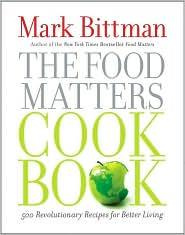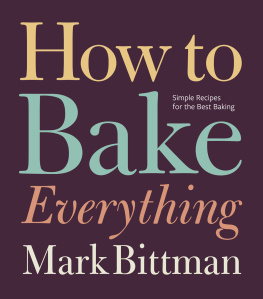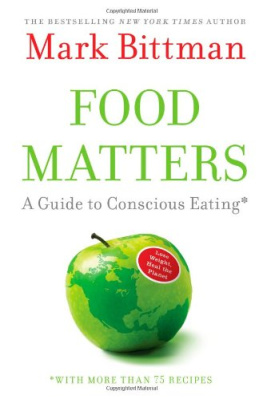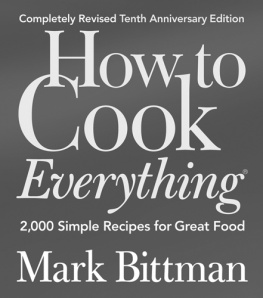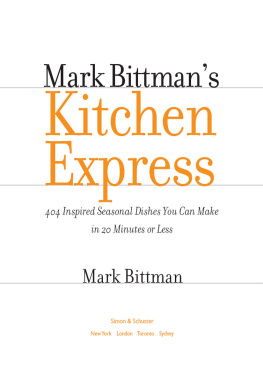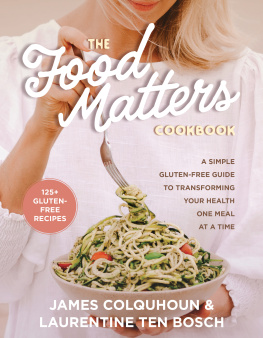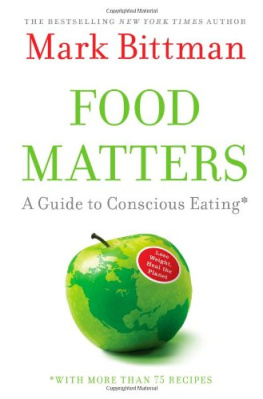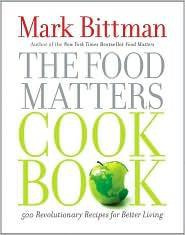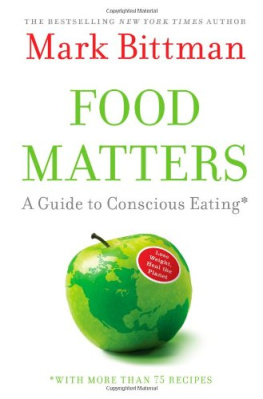
ALSO BY MARK BITTMAN
Mark Bittmans Kitchen Express
Food Matters
How to Cook Everything
How to Cook Everything Vegetarian
The Best Recipes in the World
Fish: The Complete Guide to Buying and Cooking
How to Cook Everything: Bittman Takes on Americas Chefs
Mark Bittmans Quick and Easy Recipes from The New York Times


Simon & Schuster
1230 Avenue of the Americas
New York, NY 10020
www.SimonandSchuster.com
Copyright 2010 by Mark Bittman
All rights reserved, including the right to reproduce this book or portions thereof in any form
whatsoever. For information address Simon & Schuster Subsidiary Rights Department, 1230
Avenue of the Americas, New York, NY 10020.
First Simon & Schuster hardcover edition October 2010
SIMON & SCHUSTER and colophon are registered trademarks of Simon & Schuster, Inc.
For information about special discounts for bulk purchases, please contact Simon & Schuster
Special Sales at 1-866-506-1949 or business@simonandschuster.com.
The Simon & Schuster Speakers Bureau can bring authors to your live event. For more information or to book an event contact the Simon & Schuster Speakers Bureau at 1-866-248-3049 or visit our website at www.simonspeakers.com.
Designed by Davina Mock-Maniscalco
Manufactured in the United States of America
10 9 8 7 6 5 4 3 2 1
Library of Congress Cataloging-in-Publication Data
Bittman, Mark.
The food matters cookbook / by Mark Bittman.
p. cm
1. Food. 2. Nutrition. 3. Health. 4. Cooking. 5. Cookbooks. I. Title.
TX353.B614 2010
641.3dc22
2010028623
ISBN 978-1-4391-2023-1
ISBN 978-1-4391-4123-6 (ebook)
For my mom and dad
Contents
Introduction
As of this writing, Ive been eating like Food Mattersthe title of this books predecessor, a book that encourages us to concentrate on eating more plants and fewer animal products and processed foodsfor three years. During that period Ive met scores if not hundreds of people who have either come to similar diets on their own (its not that complicated, after all) or read Food Matters. The result of my own and just about everyone elses experiences, as well as most of the research studies that have been published since then, have confirmed the conclusion I reached in the first place: If you swap the basic proportions in your dietincreasing unprocessed fruits, vegetables, legumes, nuts, and whole grainsyoull wind up losing weight and improving your overall health while also improving more difficult-to-measure situations like global warming, the environment in general, and animal welfare.
For me, its been astonishingly easy to remain on a diet that relies on far fewer animal products and processed foods than the typically American one. And this has been true even though Im a journalist and author making his living from cooking, eating, and writing about the same. At no time has my new way of eating made my jobor my lifemore difficult. If anything its easier, since I pay better attention to what goes into my mouth and fully appreciate all sorts of food, now more than ever.
Obviously, Im not alone in touting a plant-heavy diet. The publication of Food Matters in January 2009 came at the beginning of the seemingly endless discussion about national health care. But in the course of that debate, more and more peopleincluding outspoken people in the big insurance companies, Big Pharma, and even Big Foodwere seeing the link between our diet and major health issues like obesity, diabetes, and heart disease. And now that these links are accepted by the mainstream, so finally, the implicationsand the costsof the typical American diet are getting the attention they deserve.
Food and diet have become integral in food policy discussions, as they relate to issues as wide-ranging as global warming, other environmental issues, and childhood obesity. But its not only activists and advocates who are influencing the dialogue. Anyone who purchases foodwhich is to say everyonehas the opportunity to advance the changes advocated in Food Matters. Ive come to call this personal food policy, because collectively our choices can stand up to the legislators, lobbyists, and special interest groups that continue to shape the way our food is raised, produced, packaged, shipped, and marketed.
For a variety of reasons, most Americans are more aware of what theyre eating than ever before, and many sincerely want to eat better, though they might not know exactly how to do it. I hear this over and over again, and its not hard to believe, given the often confusing and conflicting information floating around. Were certainly not getting much help from our supermarket shelves or favorite restaurants, where we still have to pass up undeniably tempting and convenient junk to get at the real food.
For a more detailed summary of what Eating Like Food Matters means, read on. If none of this is new to you, skip to Part II, ) includes more than 500 recipes and variations that demonstrate just how easy and delicious it can be to become a less-meatarian and begin eating a plant-heavy diet.

Food Policy, Made Personal
When I began work on Food Matters in 2007, I had been writing about food for nearly thirty years. So I was in the press box while the American diet underwent huge changes, few of them for the better. Restaurants were booming and people were cooking less and less, while waistlinesand the health problems that accompany excess weightwere growing exponentially.
Yet despite my awareness, my own health had become a problem: I was 57, and 35 pounds overweight. My blood sugar was up, my cholesterol was up, I had sleep apnea, and I had just had knee surgery. My doctor unironically told me to become a vegan. I reminded him that I was a food writer and asked him if he was out of his mind. He reminded me that I was a smart guy and that this was serious. Figure something out, he said.
I could have seen this coming; Id just spent a couple of years working on How to Cook Everything Vegetarian, in part because I saw the writing on the wall. I knew a plant-heavy diet was a healthier diet; I was just unwilling to make the change. Still, when my marching orders came down, at least I knew a lot about cooking without meat.
And there were further incentives: As if on cue, across my (virtual) desk came a paper from the United Nations called Livestocks Long Shadow, a damning report about the connection between industrial livestock and global warming, which I can sum up very easily: The more animals we raise industrially, the more greenhouse gases we are producing. This study estimated that about 70 percent of all the land on earth is devoted to livestock production and generates 18 percent of our annual greenhouse gas emissions. More recently, analysts at an environmental organization called Worldwatch have reported that livestock and their by-products actually may account for as much as 50 percent of global greenhouse gas emissions. In the United States we eat almost 10 billion chickens, pigs, cows, and turkeys each year. And thats just us!
So I put all this togetherthe state of Americans eating habits, my own health crisis, the fate of the planet if we dont reduce the number of animals raised and slaughteredand I came up with a personal action plan: I follow a strict vegan diet until dinnertimeeating only whole grains, beans, vegetables, fruit, nuts, and seeds. After that I eat whatever I want. Thats my way; your way may be different. The critical thing is simply to shift the proportions of what you eat and make your diet as plant-heavy as you can.
Next page
